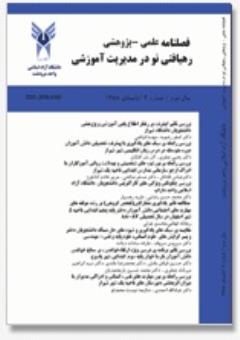شناسایی عوامل مؤثر بر اثر بخشی آموزشهای مجازی دردوران پسا کرونا از دیدگاه آموزگاران دوره ابتدایی آموزش وپرورش (استان البرز شهر کرج)
محورهای موضوعی : آموزش و پرورشآتنا درویشی ده مجنونی 1 , امیرحسین مهدیزاده 2 , علیرضا عراقیه 3
1 - برنامه ریزی درسی، گروه علوم تربیتی، دانشگاه آزاد واحد الکترونیک، تهران، ایران.
2 - مدیر گروه رشته های علوم تربیتی کارشناسی ارشد دانشگاه آزاد واحد اسلامشهر و عضو هیات علمی
3 - گروه علوم تربیتی دانشگاه آزاد اسلامی واحد اسلامشهر
کلید واژه: آموزش مجازی, آموزش وپرورش, پساکرونا, آموزگاران ابتدایی,
چکیده مقاله :
باشیوع کرونا ویروس در دسامبر 2019 آموزشهای حضوری در مدارس جایگزین آموزش مجازی شد. هدف ازپژوهش حاضرشناسایی عوامل مؤثر بر اثر بخشی آموزشهای مجازی دردوران پسا کرونا از دیدگاه اموزگاران دوره ابتدایی آموزش وپرورش (استان البرز شهر کرج) بود. این پژوهش از لحاظ هدف تحقیق از نوع تحقیقات کاربردی و بر حسب نحوه گردآوری دادهها از نوع تحقیقات توصیفی - پیمایشی میباشد. جامعه آماری پژوهش شامل تمامی آموزگاران دوره ابتدایی شهر کرج بود که تعداد آنها 9640 نفر میباشد که برای تعیین حجم نمونه با مراجعه به جدول مورگان کرجسی تعداد 369 نفر به عنوان افراد نمونه مشخص شدند در این پژوهش از روش نمونه گیری تصادفی ساده استفاده شد. ابزار گردآوری دادهها در این تحقیق مصاحبه وپرسشنامه پژوهشگر ساخته بود. جمعآوری اطلاعات دردومرحله کتابخانهای ومیدانی انجام گرفت. یافتهها با استفاده از نرمافزار آماری SPSS20 دربخش آماراستنباطی و شناسایی عوامل مؤثر بر اثربخشی آموزشهای مجازی در دوران پسا کرونا تمامی گویه های تعامل، پیامد، مهارتافزایی وعملکرد را مورد تأیید قرارداد ودربخش رتبه بندی نشان داد که بعد مهارت افزایی با میزان میانگین (54/2) در رتبه اول و در رتبههای بعد به ترتیب ابعاد تعامل با میزان میانگین (51/2)، عملکرد با میزان میانگین (50/2) و پیامد با میزان میانگین (46/2) قرار دارد. نتیجه این پژوهش نشان داد مولفهها وراهکارهای ارائه شده در پژوهش حاضر با دقت مدنظر مسئولان آموزشی قرار گیرد ودر مدارس ابتدایی پیگیری شود تا درنتیجه آن شاهد افزایش اثربخشی وبهرهوری مدارس باشیم و دردوران پس ازکرونا باعث ارتقاء قابلیتها وتوانمندیهای معلمان درراستای تربیت هرچه بهتر دانشآموزان باشیم.
Due to the spread of the corona virus in December 2019, face-to-face training in schools was replaced by virtual training. The aim of the present study was to identify the factors affecting the effectiveness of virtual education in the post-Corona period from the point of view of primary education teachers (Alborz province, Karaj city). In terms of the purpose of the research, this research is of the type of applied research and in terms of the method of data collection, it is of the type of descriptive-survey research. The statistical population of the research included all the primary school teachers in Karaj city, whose number is 9640. To determine the sample size, 369 people were identified as sample people by referring to Morgan Karajsi's table. Simple random sampling method was used in this research. The tools of data collection in this research were interviews and questionnaires made by the researcher. Data collection was done in the library and field stage. Findings using SPSS20 statistical software in the inferential statistics section and identifying factors affecting the effectiveness of virtual training in the post-Corona era showed that all items of interaction, outcome, skill enhancement and performance were approved by the contract and in the rating section, the skill enhancement dimension with an average rate of (54) 2.2) In the first rank and in the following ranks respectively, the dimensions of interaction with an average amount (2.51), performance with an average amount (2.50) and consequence with an average amount (2.46) are located. The result of this research showed that the components and methods presented in the current research should be carefully considered by educational authorities and followed up in elementary schools, so that as a result, we can witness an increase in the effectiveness and productivity of schools, and in the post-corona era, we can improve the capabilities and abilities of teachers in order to educate students as best as possible.


